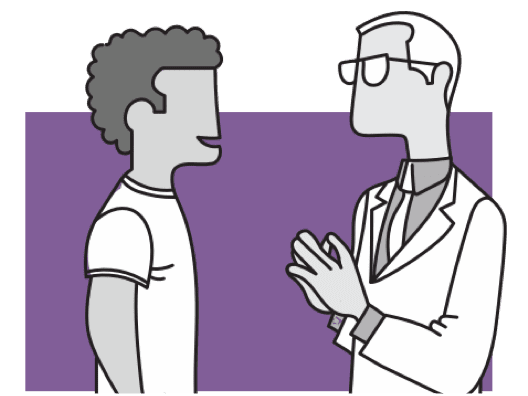Model portrayal above
This Gilead website is intended for U.S. audiences only.
Research shows that starting HIV treatment as soon as possible after diagnosis can offer important health benefits. One of the most important benefits is getting your viral load to undetectable. Undetectable means that there is so little virus in the blood that a lab test can't measure it. Other benefits may include:
Talk to your doctor about starting treatment right away to help get you to undetectable sooner than you might think.
You can start treatment as soon as your healthcare provider (HCP) recommends it. Some treatments can even be started the same day that you are diagnosed.
People featured are compensated by Gilead.
If you’re living with HIV, you may wonder: What does HIV treatment actually do for me?
Actually?
A lot.
Many treatment options are available.
And most are made up of three different medicines, which can even be in a single pill. Together they can fight HIV in more than one way.
Plus, taking HIV treatment every day, helps make sure there’s always enough medicine in your body to fight the virus.
And that helps make it possible to live a longer and healthier life.
Now, here are 5 reasons to stick with treatment.
It all starts here, with the most important reason of all. Less virus in your body.
Left untreated the amount of HIV in your body—your viral load—goes up.
Taking HIV treatment helps bring it down.
And sticking with treatment helps keep it down.
It can get so low, it can’t be measured by a test.
That’s undetectable.
You still have HIV, but there’s a lot less of it causing damage in your body.
And a lower viral load means a lower chance of developing certain infections, some cancers, and AIDS. And when you’re undetectable that brings us to number 2.
Protect your partners.
Taking HIV treatment every day means you can get to and stay undetectable. And that prevents the spread of HIV through sex, according to current research.
It’s called “Treatment as Prevention.”
But think of it as “treat to prevent.” It’s a big deal.
But, HIV is still in your body, and being undetectable doesn’t prevent other sexually transmitted infections.
So be safe and use condoms.
Now, on to number 3.
More CD4 cells.
Taking HIV treatment as prescribed, helps restore your body’s defense network—your immune system.
Inside your body are CD4 cells, the cells that defend against germs.
But HIV invades CD4 cells.
It takes over, and uses them to make more HIV.
Pretty soon, there’s lots of HIV, and not enough CD4 cells.
HIV treatment helps keep this from happening.
It raises the number of CD4 cells, so you have more of them to defend against things that can make you sick.
Sound good so far? Well, here’s number 4.
Less virus can mean less inflammation
Now, inflammation is something you can’t always see.
But it’s part of your body’s normal healing process. It’s usually short-term. And typically, it’s a good thing.
But, here’s what it means when you’re living with HIV. Because the virus is always in your body, it can cause long-term inflammation, if left untreated. And that’s a bad thing.
It puts constant stress on your immune system. And it can lead to serious diseases and cancers.
But taking treatment can help lower your viral load. And that helps ... reduce inflammation.
Which brings us to number 5.
Avoid resistance.
Because a durable HIV treatment helps keep the virus from getting ... sneaky. See, if you’re not taking a treatment that’s right for you, or if you don’t take your treatment every day, the level of medicine in your body may not be enough to keep HIV from changing.
It can become resistant to your treatment. Which means your treatment may not work as well to fight HIV. And resistance can make HIV harder to treat. Now and in the future. Buuuuuut ... if your treatment is ready to fight back and you take it exactly the way your healthcare provider says, it helps keep your treatment working ... the way it should.
So, there you have it.
Five really important things that taking an effective treatment does for you.
Remember, there is no cure for HIV. But sticking with treatment means you’re protecting your health. And, it helps make it possible to live a longer and healthier life.
Questions? Talk to a healthcare provider.
Plus, you can get more information, and watch more videos, at HelpStopTheVirus.com and on YouTube. So, stick with treatment. And help ... stop the virus.
Current research shows that taking HIV treatment as prescribed and getting to an undetectable viral load and staying undetectable prevents the transmission of HIV to others through sex. And that is just one of many reasons why sticking to treatment is important.
FEATURED VIDEO:
HIV: 5 reasons to stick with treatment
No questions are off-limits when you meet with them, and it's great to come prepared. Here are some questions to copy and save for your visit.

